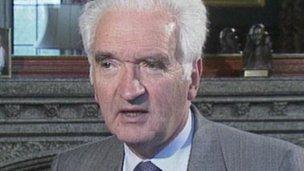Provoking peers
- Published
- comments
The conventional wisdom in the Lords yesterday morning was that no rational government takes on the former Lord Chancellor Lord Mackay, external.
And so his amendment to the Welfare Reform Bill - on the issue of charging single parents if the Child Maintenance and Enforcement Commission has to intervene to extract payments from the other parent of their child - was bound to result in a concession by ministers.
This, as they say in Westminster, proved not to be quite the case. Lord Mackay, in the gentlest possible way, inflicted a massive defeat on the government. This time there was a substantial rebellion by Conservative peers, with 34 defying the party whip, along with 16 Lib Dems. The Lib Dem abstention rate was higher than usual, too, with nearly half their peers failing to vote. And most important of all, the crossbenchers - who often split fairly evenly, as they did in Tuesday's government defeat - backed Lord Mackay by 57 votes to 1.

Taking on his lordship proved a costly exercise for the government
What's striking about the list of Conservative rebels is their eminence. At times the list of rebels reads like a roster of Thatcher/Major era cabinet ministers - milords Carrington, Jenkin, Wakeham, Mawhinney, Newton, Brittan, Crickhowell, Howe, Lawson and Mayhew - which makes the result all the more stinging for the coalition.
The result was a majority of 142 votes against the government - and another chunk of the savings the government wants to extract from its welfare reforms binned by peers.
The government has now been defeated six times on the detail of its welfare reforms - on this issue, on the household benefit cap, on benefits for cancer patients, on a 12-month limit for contributory employment support, on the treatment of severely disabled young people and the underoccupancy penalty for social housing tenants.
The question now is whether peers can make those defeats stick. Any changes peers make to a bill have to be approved, or rejected by the Commons, and ministers have already indicated that they will seek to overturn them. So if the bill bounces back to the Lords, with all those changes excised, will the majorities behind them (which vary from 15 on the household cap, to 142 for Lord Mackay's amendment) turn out again to "insist" on the amendments. Some peers take the view that their job is to ask the Commons to think again, and, having done so, their work is done. So they may not be prepared to stick with the amendments they voted for at report stage - especially if ministers offer some concessions or assurances to meet their concerns.
In short, we will see a combination of bluff and bargaining, with the results tested in votes in which peers will be invited to insist on their amendments or drop them. This process will be repeated until both Houses agree - on this bill and on several others.
And that it what Parliament is going to be doing for the remainder of this Parliamentary year.
* Hat-tip to the Constitution Unit, external